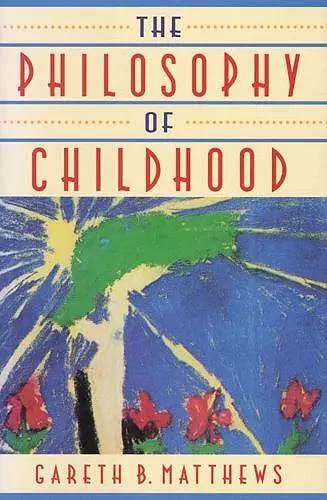The Philosophy of Childhood
Format:Paperback
Publisher:Harvard University Press
Published:31st Oct '96
Should be back in stock very soon

So many questions, such an imagination, endless speculation: the child seems to be a natural philosopher--until the ripe old age of eight or nine, when the spirit of inquiry mysteriously fades. What happened? Was it something we did--or didn't do? Was the child truly the philosophical being he once seemed? Gareth Matthews takes up these concerns in The Philosophy of Childhood, a searching account of children's philosophical potential and of childhood as an area of philosophical inquiry. Seeking a philosophy that represents the range and depth of children's inquisitive minds, Matthews explores both how children think and how we, as adults, think about them.
Adult preconceptions about the mental life of children tend to discourage a child's philosophical bent, Matthews suggests, and he probes the sources of these limiting assumptions: restrictive notions of maturation and conceptual development; possible lapses in episodic memory; the experience of identity and growth as "successive selves," which separate us from our own childhoods. By exposing the underpinnings of our adult views of childhood, Matthews, a philosopher and longtime advocate of children's rights, clears the way for recognizing the philosophy of childhood as a legitimate field of inquiry. He then conducts us through various influential models for understanding what it is to be a child, from the theory that individual development recapitulates the development of the human species to accounts of moral and cognitive development, including Piaget's revolutionary model.
The metaphysics of playdough, the authenticity of children's art, the effects of divorce and intimations of mortality on a child--all have a place in Matthews's rich discussion of the philosophical nature of childhood. His book will prompt us to reconsider the distinctions we make about development and the competencies of mind, and what we lose by denying childhood its full philosophical breadth.
Matthews' guided dialogues with children show that they consistently and happily develop philosophical trains of thought, evaluate those of others, and try to think things through, often reaching solutions that are essentially the ones propounded by the big people who are lucky enough to be paid for doing it...With careful listening and without distorting preconceptions about what children might or might not be capable of doing, Mr. Matthews has unearthed a seam of would-be wisdom. His open-minded attention to the way children's minds work has also yielded a new concept of childhood intelligence that may bear on the question of children's rights, children's art and the status of literature for children. He argues that the philosophy of childhood should be a respectable branch of philosophy, like the philosophy of science or the philosophy of law. This strikes me as too modest a goal. Mr. Matthews' incisive investigations into the relations between the world of children and the world of adults are too thought-provoking to be confined to one branch of one academic subject...He subjects Jean Piaget's theory of cognitive development and Lawrence Kohlberg's theory of moral development to simple and searching criticisms that make his book essential reading for anybody interested in early childhood education. -- Anthony Gottlieb * New York Times Book Review *
As overriding themes, he voices his clear opinion that both the study of children's philosophical thinking and the philosophy of childhood should be legitimate not only to our understanding of children, but also to our own ways of thinking
Matthews' book serves as a compelling reminder of the humanity of our co-participants in the study of human development. -- Lucien T. Winegar * Theory and Psychology *
The mind of the child...concerns Gareth Matthews' eloquent and thoughtful essays in The Philosophy of Childhood...In this book he raises a question...Do the philosophical sensibilities of children have any serious value? Or are they of no value because they come from immature minds? Matthews' view is that children's philosophical interests are not only valuable and profound but also are sadly perishable...[He] writes that adults who would do philosophy have much to learn from children. -- David Mehegan * Boston Globe *
A stimulating work, worthy of attention. -- Nicholas Tucker * Times Educational Supplement *
The Philosophy of Childhood is an attractive and thought-provoking work which also opens up territory which has seldom, if ever, been explored, for example, on childhood amnesia and childhood and death...[T]he work merits the serious study of both philosophers and students in such more practical professional fields as education and child psychology. -- David Carr * Philosophical Quarterly *
This is a very interesting book written in a clear and straightforward style suitable for the layman and beginner as well as the professional philosopher...It is essentially about human rights, and insofar as it addresses the issue of the childlike nature of engaging in philosophy itself, it will surely contain something of interest for all philosophers. * The Philosopher *
[Matthews] illustrates his thesis with poignant and incisive vignettes. His is a compelling argument for establishing the philosophy of childhood as an academic area of inquiry in which to explore how children think, listen, and reason. This interesting, readable book should appeal to anyone who works with children. -- John J. DeFrancesco, Ph.D. * Readings: A Journal of Reviews and Commentary in Mental Health *
ISBN: 9780674664814
Dimensions: unknown
Weight: 181g
136 pages